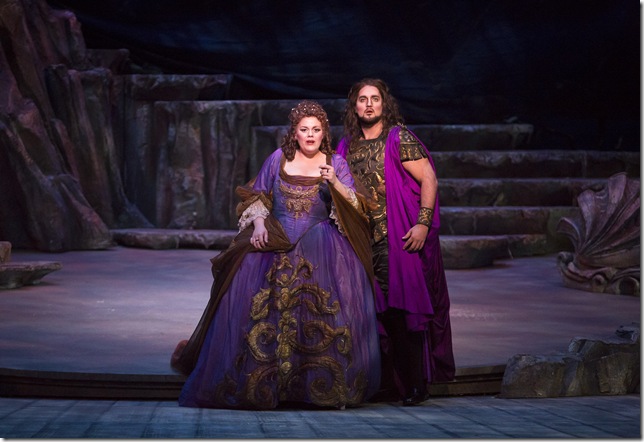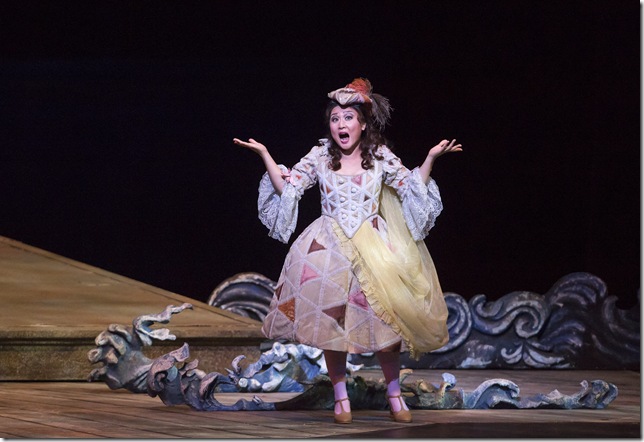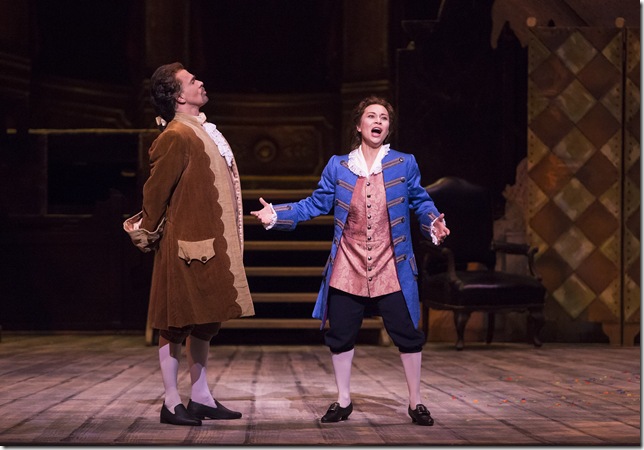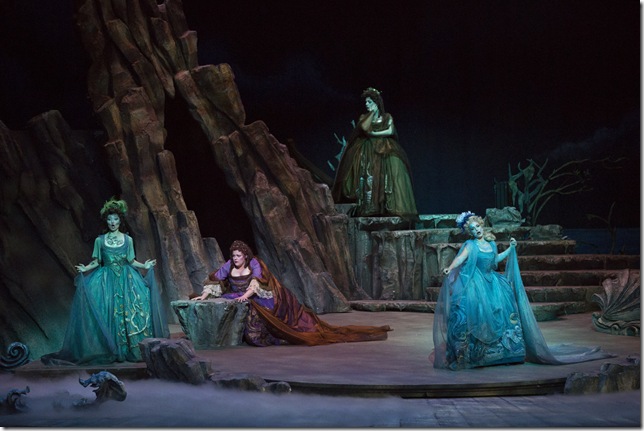Wendy Bryn Harmer and Brian Jagde in Ariadne auf Naxos.
The audience response Sunday afternoon to Palm Beach Opera’s final presentation of Richard Strauss’s Ariadne auf Naxos wasn’t the kind of enthusiastic ovation a more familiar opera from the Italian repertory would have won.
But if they weren’t crazy about the opera itself, the troupe deserved all the warm approbation left over for showing once again the depth of its vocal casting. Just as in last month’s Don Pasquale, the cast from lead on down to comprimario was seriously impressive, not least for the Young Artists cadre singing this year.
Directed by Daniel Witzke, using a production from the New Orleans Opera and featuring the musical direction of the great German conductor Andreas Delfs, this Ariadne was a musically stellar way to end the season (though still to come is a Liederabend at the Royal Poinciana Chapel on Palm Beach next week).
Kathleen Kim in Ariadne auf Naxos.
In the “A” cast of this double-cast production, Ariadne was sung by the heroically voiced Wendy Bryn Harmer, whom Palm Beach Opera regulars will remember for her titanic Adalgisa in the company’s 2009 production of Bellini’s Norma. The voice sounds less youthful than it did then, but it is still a Wagnerian-quality instrument, with huge power and remarkable stamina for the retread of Tristan (and Der Rosenkavalier) that ends this opera.
Every bit her equal was her Bacchus, Brian Jagde, a stentorian-voiced tenor who had the extra Helden-heft to give this music the radiance it needs. He sang this difficult part — which is not so much unremittingly high as it is demanding from the standpoint of a continual 20-minute series of big gestures — with apparent ease, and his voice blended beautifully with Harmer’s.
In the showcase role of Zerbinetta, which has the monstrously hard aria, “Grossmächtige Prinzessin,” in the second part, the South Korean soprano Kathleen Kim had a welcome lightness to her voice that is surely in keeping with the idea of this character. She sang her showpiece well, but it came off somewhat limply as a whole, perhaps because of the stage business, which required her to move around quite a bit. But she, too, was able to make this absurdly challenging piece sound relatively natural and easy — especially on the trill and downward arpeggio that leads into the final section — even when it climbed into the stratosphere.
Mark Schnaible and Irene Roberts in Ariadne auf Naxos.
Mezzo Irene Roberts, a house favorite when she was a Young Artist and in her appearances as Suzuki in Madame Butterfly and Nicklausse in Les Contes d’Hoffmann, was a splendid Composer. Her voice is big and lush, but here it also had an extra agility and strength, particularly in her “Sein wir wieder gut.” She has an enviable clarity of compass, down at the dark bottom of her register as well as at the thrilling top. At the end of that aria, she sounded exuberant and joyful, which seems to me is exactly how the Composer should feel at that point.
Mark Schnaible, as the Music Teacher, showed off a beautiful, resonant bass, and tenor John Easterlin was a fine Dancing Master, with a forceful voice that demanded attention. Tenor Anthony Laciura, a Metropolitan Opera veteran now perhaps better-known for his years as Eddie Kessler on HBO’s Boardwalk Empire, was a lot of fun in the speaking role of the Majordomo, making much of the point when he has to say the opera is going to have to be combined with comedy to save time and finish up before the fireworks.
Fleur Barron, Wendy Bryn Harmer, Liana Guberman and Jessica Fishenfeld in Ariadne auf Naxos.
Three of the Young Artists — soprano Jessica Fishenfeld as Najade, soprano Liana Guberman as Echo and mezzo Fleur Barron as Dryad — were wonderful in their roles as the trio of nymphs on Naxos; Barron was particularly memorable in her singing, with a dark, lovely sound that added distinction to the trio. Baritone Kenneth Stavert, a former Young Artist, returning to the company as Harlekin, sang marvelously well. His voice has broadened and become much more confident-sounding since his earlier appearances here, and he made this relatively small role work beautifully.
The other three members of the comic team, tenors Robert Watson (Brighella) and Spencer Viator, (Scaramuccio) and bass Andrew Bogard (Truffaldino), also sang well and offered good stage hijinks; there was a fine contrast between the high emotions of the island activity and the impish energy of the commedia dell’arte characters.
Working with the 36-piece orchestra Strauss scored this opera for, Delfs proved masterful, never allowing this sometimes-treacly music to be overdone, and finding the Straussian sinew amid all those slippery harmonic periods. The singers took front and center, and the orchestra obliged. It’s worth noting, too, that in addition to the stronger vocal casting, this Palm Beach Opera season has benefited from three expert conductors: David Stern, Antonino Fogliani, and Delfs.
Witzke’s stage direction was diverting, though a touch more chaos in the Prologue would have made the point of the opera, and the Composer’s distress over the choice he has to make, clearer. And the Naxos act also would have been somewhat more interesting with more involvement of the comedians.
Wolfram Skalicki’s set designs were straightforward and whimsical, and SeifAllah Salotto-Cristobal’s lighting design was particularly effective in the second part, as Bacchus is revealed standing in a god-gazebo in the sky.
German repertory is exceedingly rare at Palm Beach Opera, with just Strauss’s Salome a couple years back to break a long drought (and next year’s season, with Puccini and Verdi warhorses plus Gilbert and Sullivan, won’t do anything to change that). That was an added pleasure of this production, though the opera itself, which has achieved something of a cult following these days, is marred by its indebtedness to Der Rosenkavalier and its melodic material, which is far less inspired than that of the earlier opera.
But it has enough good music to keep a place in the repertory, and the company deserves credit for mounting it and casting it with enough first-class voices to give a fine account of the work.



